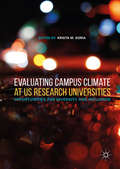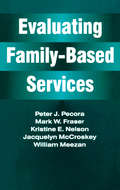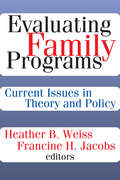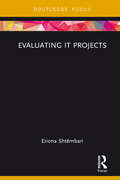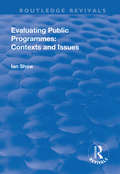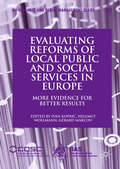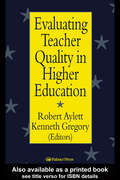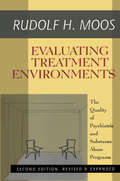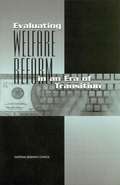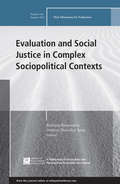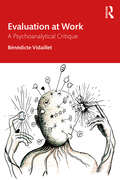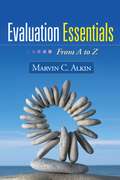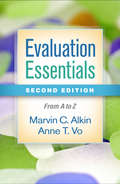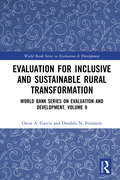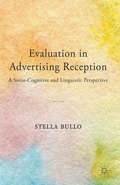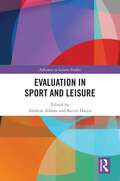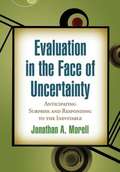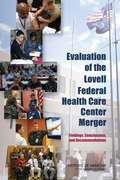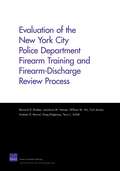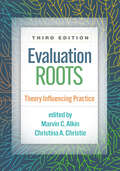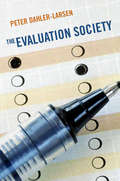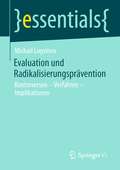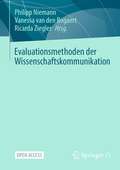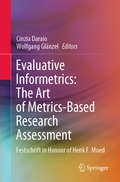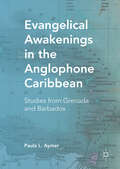- Table View
- List View
Evaluating Campus Climate at US Research Universities: Opportunities for Diversity and Inclusion
by Krista M. SoriaThis book examines campus climate data collected from undergraduates at several large, public research universities across the nation to enhance understanding of the long-term impact of campus climate on student success. Many universities have refocused their attention and energy on campus climate, defined in this volume as students’ perceptions of how welcoming and respectful their campus environments are for students from different social identities. As structural diversity continues to grow more complex on college campuses around the nation, campus leaders have begun to take more steps to understand campus climate and address persistent inequalities, acts of discrimination, and violence against students from diverse backgrounds. The authors in this volume address initiatives to improve campus climate and provide empirical evidence on the effectiveness of those programs.
Evaluating Family-Based Services
by Peter J. Pecora Mark W. Fraser Kristine E. Nelson Jacquelyn McCroskey William MeezanFirst Published in 2018. Routledge is an imprint of Taylor & Francis, an Informa company.
Evaluating Family Programs: Current Issues in Theory and Policy
by Heather B. Weiss Francine H. JacobsThe diverse composition of American families and changing ways of raising our children have become subjects of intense scrutiny by researchers and policymakers in recent years. Shifting demographics and work patterns, growing numbers of women in the work force, teenage pregnancy, single-parent families, and the deinstitutionalization of the elderly, disabled, and mentally ill--all these trends have significantly affected family life. Evaluating Family Programs effectively bridges the gap between researchers and practitioners in order to bring practical, understandable advice to providers of family programs and to program funders and policymakers.Heather B. Weiss and Francine H. Jacobs have collected in this volume works which move outside the traditional approaches of their disciplines to create new models for delivering and evaluating services. This sets a mood of genuine inquiry and excitement about successful aspects of programs while maintaining openness about the limitations of both research and practice. By expanding the research model, this work is an attempt to understand reciprocal influences of extended family, culture, community, and social institutions. It urges those who advocate program accountability to understand that not all types of evaluations are appropriate for all programs, and it notes that limitations in current evaluation technologies make it difficult to evaluate outcomes.Evaluating Family Programs reminds the reader that in order to develop sound family policy we must look at children and families in context. Beacuse policymakers, program administrators, and informed citizens have come to rely more upon the results of evaluation research, we must improve our methods while not losing sight of its limitations. It is a thought-provoking contribution to the efforts of those who seek to support the American family with compassion, understanding, and realism.
Evaluating IT Projects (Routledge Focus on Business and Management)
by Eriona ShtëmbariProject management disciplines have been a part of IT for many years. Why then, are so many challenges still directly associated with how a project is managed? Many projects fail for a myriad of reasons; most, however, stem from poor or inadequate project evaluation and performance appraisal, while, improved project planning and direction is considered to be one of the key factors to IT project success. Eriona Shtembari arranges evaluation methods and techniques into three groups, managerial-financial-and-development. This book explores the process of project evaluation and the purposes of evaluation, given its strong relationship to the success of the project. It examines IT project evaluation; identifies methods and techniques to be used throughout the project life cycle; examines the benefits of project evaluation and proposes a systematic approach/framework of project evaluation to serve as a tool for successful project management. <P><P>Shtembari analyses the most up-to-date research relating to the process and methods/techniques of project evaluation, throughout the project life cycle. From the systematic literature review, she identifies the most usable methods and techniques in project evaluation and focuses on the adequacy of these methods and techniques in the service sector. The theoretical underpinning of the book, serves as a base to interpret the interviews in the case study and build a theory as to how the project evaluation context relates to the proposed scientific theory. The findings in this book provide solutions for practitioners to help them boost the evaluation framework and consequently improve their IT project management.
Evaluating Public Programmes: Contexts And Issues (Routledge Revivals)
by Ian ShawThis title was first published in 2000: A detailed study of a number of key issues arising in evaluation research, in particular the impact of context upon evaluation findings and the implication context has for methodology. Providing case study illustrations, the work includes discussion of definitions and uses, experimental logic, methods and difficulties in experimental evaluations and the importance of incorporating both process and context in evaluation research design.
Evaluating Reforms of Local Public and Social Services in Europe
by Ivan Koprić Hellmut Wollmann Gérard MarcouThis book explains the increasing demand for evaluation as a result of the increasing frequency of reforms to local services, influenced by the New Public Management doctrine, the severe austerity policy in many European countries, and the wish to increase quality and reduce costs of public services, especially at the local (sub-national) level. Positioned at the interface of local services and evaluation research, it will enable the utilization of evaluation-generated knowledge in evidence-based policy making by focusing on the lessons learned from evaluation of local service delivery. It encompasses local public and social services (including waste, water, public transport, healthcare, education and eldercare) and examines the hypothesis that there is a North-West-South-East divide in Europe in terms of the evaluation of local service reforms. Particular attention is devoted to the explanatory function of evaluation. Providing fresh insight into the functioning of local government machinery in contemporary Europe, this book will appeal in particular to practitioners and students of local government, public economy, public administration and policy.
Evaluating Teacher Quality in Higher Education
by Robert Aylett Kenneth GregoryDrawing on material presented at a one day conference, this collection addresses the need to recognize academics' contributions to higher education, as well as the ways in which academics' efforts in the teaching and learning process can be acknowledged and suitably rewarded.
Evaluating Treatment Environments: The Quality of Psychiatric and Substance Abuse Programs
by Rudolf H. MoosEvaluating Treatment Environments describes how to assess the quality of psychiatric and substance abuse programs and how to use that information to monitor and improve these programs. Its aim is to identify environments that promote opportunities for personal growth, simultaneously enhancing both physical and psychological well-being. Although treatment programs are diverse, Moos asserts that a common conceptual framework can be used to evaluate them, and more emphasis should be placed on the process of matching personal and program factors and on the connections between such matches and patients' outcomes.The book is divided into three main parts. Part I focuses on hospital programs, using a sample of 160 programs throughout the United States. Part II evaluates community programs. Moos describes how to monitor and improve these programs, and assesses program implementation. Part III considers treatment environments, examining factors that shape the treatment environment, patients' satisfaction with and participation in program activities, patients' adaptation and community living skills, and patient-program congruence and the influence of treatment environments on patients with different levels of impairment. It also highlights the importance of the health care workplace and its impact on staff and the treatment environment.Treatment programs vary substantially in their policies and services, especially in what they expect of clients, rules about clients' daily life choices, and to what extent clients must be governed by the program, and whether or not the programs provide health and treatment services. Comparison studies are becoming more important as clients move more quickly from acute in-patient to community residential care. Moos stresses the need to pay special attention to how programs and services affect clients when conducting evaluations. Evaluating Treatment Environments will be a necessary addition to the libraries of mental health service professionals, as well as sociologists, psychiatrists, psychologists, and social workers.
Evaluating Welfare Reform in an Era of Transition
by Institute of MedicineReform of welfare is one of the nation's most contentious issues, with debate often driven more by politics than by facts and careful analysis. Evaluating Welfare Reform in an Era of Transition identifies the key policy questions for measuring whether our changing social welfare programs are working, reviews the available studies and research, and recommends the most effective ways to answer those questions.This book discusses the development of welfare policy, including the landmark 1996 federal law that devolved most of the responsibility for welfare policies and their implementation to the states. A thorough analysis of the available research leads to the identification of gaps in what is currently known about the effects of welfare reform.Evaluating Welfare Reform in an Era of Transition specifies what-and why-we need to know about the response of individual states to the federal overhaul of welfare and the effects of the many changes in the nation's welfare laws, policies, and practices.With a clear approach to a variety of issues, Evaluating Welfare Reform in an Era of Transition will be important to policy makers, welfare administrators, researchers, journalists, and advocates on all sides of the issue.
Evaluation and Social Justice in Complex Sociopolitical Contexts: New Directions for Evaluation, Number 146 (J-B PE Single Issue (Program) Evaluation)
by Barbara Rosenstein Helena Desivilya SynaThis volume is devoted to the theme of social responsibility, social justice, and evaluation. It examines the evaluation–social justice interface and: shares a variety of options and examples from different settings, gives voice to populations whose voices are rarely heard, and contributes to fulfilling the potential of the significant role evaluation can have in promoting social change. First discussing issues related to evaluation, social responsibility, social justice, and marginalized populations in general, it goes on to address issues concerning populations marginalized due to health, psychological, and physical difficulties; their cultural or ethnic/national status; or the specific geopolitical context of Israel. This is the 146th issue in the New Directions for Evaluation series from Jossey-Bass. It is an official publication of the American Evaluation Association.
Evaluation at Work: A Psychoanalytical Critique
by Bénédicte VidailletEvaluation at work has attracted much criticism and its damaging effects are well known, so why does it continue to gain ground in every field? Evaluation at Work: A Psychoanalytical Critique offers an original answer to this question: evaluation spreads because we want to be evaluated. Developing a critical reflection from a psychoanalytic perspective, it argues that workers are not mere victims of evaluation systems but are complicit in them. In this fascinating volume, Bénédicte Vidaillet focuses on the aspects of our subjectivity that come into play in evaluation at work —our expectations, desires, need for recognition, our conceptions of ourselves at work, as well as our relationship with others such as colleagues, managers or clients — to explore how evaluation affects us, where it gets its evocative power, and what it stirs within us to make us want it, despite its detrimental effects in its currently practiced form. Chapters draw on real-life examples, case studies from a variety of organizations, and observations from clinical practice, to provide insight into the many mechanisms that have enabled evaluation to spread unimpeded through our subjective complicity in the process, revealing how they came to seem so innocuous. This book will be of interest to scholars studying the topic of evaluation at work from a critical perspective as well as professionals who use evaluation systems or are under the pressure of evaluation in all sectors and organizations. By exposing the psychological mechanisms that evaluation uses to appeal to us, it gives each of us the tools we need to break free of its grasp.
Evaluation Essentials
by Marvin AlkinWritten in a refreshing conversational style, this text thoroughly prepares students, program administrators, and new evaluators to conduct evaluations or to use them in their work. The book's question-driven focus and clear discussions about the importance of fostering evaluation use by building collaborative relationships with stakeholders set it apart from other available texts. In 26 concise sections, Marvin C. Alkin explores how to articulate answerable evaluation questions, collect and analyze data using both quantitative and qualitative methods, and deal with contingencies that might alter the traditional sequence of an evaluation. Student-friendly features include handy bulleted recaps of each section, "Thinking Ahead" and "Next Steps" pointers, cautionary notes, annotated suggestions for further reading, and an in-depth case study that provides the basis for end-of-chapter exercises.
Evaluation Essentials, Second Edition: From A to Z
by Marvin C. Alkin Anne T. VoThoroughly revised and updated, this engaging text has given thousands of students and new evaluators the practical information and expert advice needed to conduct or use evaluations. In 26 concise sections, the book describes how to articulate answerable evaluation questions, collect and analyze data using both quantitative and qualitative methods, and deal with contingencies that might alter the traditional sequence of an evaluation. Special strengths of the text are its attention to individual, organizational, and community culture and emphasis on building collaborative relationships with stakeholders. An in-depth case study and related end-of-section exercises (including group activities) help students put themselves in the evaluator role. Other pedagogical features include section titles written as questions, bulleted recaps of each section, "Thinking Ahead" and "Next Steps" pointers, cautionary notes, and suggestions for further reading. New to This Edition *New and expanded topics: evaluation contracts, budgeting, surveys, data visualization, qualitative coding and memoing, factors affecting evaluation use, and context-sensitive evaluation. *Revised case study with extended exercises that guide the reader to complete a simulated evaluation. *End-of-section "Quick Read" links to recommended American Evaluation Association blog posts. *Four entirely new sections (such as "How Do You Strengthen Relationships with Stakeholders?" and "How Do We Plan a Process-Focused Evaluation Design?"), plus other changes and additions throughout.
Evaluation for Inclusive and Sustainable Rural Transformation: World Bank Series on Evaluation and Development, Volume 9 (World Bank Series on Evaluation & Development)
by Oscar A. García Osvaldo N. FeinsteinWritten by a team of expert practitioners at the Independent Office of Evaluation of IFAD, this book gives an overview of evaluation practice at IFAD. It looks at how evaluation practice has evolved to reflect, respond to and inform changing expectations of development assistance. It reveals how evaluation products and methodologies have benefited from key reviews, revisions and lessons learned, and also how they have progressively strengthened IFAD’s capacity to assess its operations and better understand its results. The book concludes with reflections on some of the challenges that lie ahead, including how the independent evaluation function can continue to evolve to meet future challenges and enhance the impact of development initiatives on people’s lives. This valuable insight into practice will be of interest to researchers, practitioners and policymakers in development economics, development studies and rural studies.
Evaluation in Advertising Reception
by Stella BulloPlaced within the context of reception studies, this book investigates how advertisements that rely on re-contextualising shared cultural knowledge are understood by their viewers, and examines their persuasive potential.
Evaluation in Sport and Leisure (Advances in Leisure Studies)
by Andrew AdamsThis book presents a critical assessment of evaluation theory and practice in sport and leisure. It considers established and emerging forms of evaluation; examines typologies, issues, contexts and processes, and asks how evaluation practice can be improved in the future. The book seeks to uncover some of the tensions and dilemmas that are present in choosing and applying evaluation strategies. It considers the relationship between evaluation, context and evaluator to discern how and why a particular strategy is employed. It also highlights how power relationships affect and effect the evaluation process itself as well as those involved in conducting evaluations. The book encourages the reader to challenge accepted methodologies in evaluation, whilst acknowledging the central importance of evaluation and evidence for our understanding of the social impact and value of sport and leisure. This book is important reading for any student, researcher, practitioner or policy maker with an interest in sport, leisure and society, sport and leisure management, policy or development, leisure studies, or the wider relationship between sport, leisure, wellbeing and society.
Evaluation in the Face of Uncertainty
by Jonathan MorellUnexpected events during an evaluation all too often send evaluators into crisis mode. This insightful book provides a systematic framework for diagnosing, anticipating, accommodating, and reining in costs of evaluation surprises. The result is evaluation that is better from a methodological point of view, and more responsive to stakeholders. Jonathan A. Morell identifies the types of surprises that arise at different stages of a program's life cycle and that may affect different aspects of the evaluation, from stakeholder relationships to data quality, methodology, funding, deadlines, information use, and program outcomes. His analysis draws on 18 concise cases from well-known researchers in a variety of evaluation settings. Morell offers guidelines for responding effectively to surprises and for determining the risks and benefits of potential solutions.
Evaluation of the Lovell Federal Health Care Center Merger: Findings, Conclusions, and Recommendations
by Committee on Evaluation of the Lovell Federal Health Care Center MergerThe 2010 opening of the Captain James A. Lovell Federal Health Care Center (FHCC) created a joint entity between the Department of Defense (DoD) and the Department of Veterans Affairs (VA) that replaced two separate centers in North Chicago. VA and DoD leaders envisioned a state-of-the-art facility that would deliver health care to both DoD and VA beneficiaries from northern Illinois to southern Wisconsin, providing service members and veterans seamless access to an expanded array of medical services. Unprecedented for the military and the VA, the Lovell FHCC would integrate clinical and administrative services under a single line of authority. The DoD asked the IOM to evaluate whether the Lovell FHCC has improved health care access, quality, and cost for the DoD and the VA, compared with operating separate facilities, and to examine whether patients and health care providers are satisfied with joint VA/DoD delivery of health care. Evaluation of the Lovell Federal Health Care Center Merger: Findings, conclusions, and Recommendations finds that initial implementation of the Lovell FHCC has provided important lessons about how to integrate VA and DoD health care services and has identified remaining obstacles that the departments could overcome to make such mergers more effective and less costly to implement. The IOM recommends that the VA and the DoD develop a comprehensive evaluation plan to objectively judge its success or failure, with measurable criteria, that would provide essential knowledge for both the Lovell FHCC and future endeavors.
Evaluation of the New York City Police Department Firearm Training and Firearm-Discharge Review Process
by Andrew R. Morral Lawrence M. Hanser Carl Jensen Bernard D. Rostker William M. HixIn January 2007, New York City Police Commissioner Raymond W. Kelly asked the RAND Corporation to examine the quality and completeness of the New York City Police Department's firearm-training program and identify potential improvements in it and in the police department's firearm-discharge review process. This monograph reports the observations, findings, and recommendations of that study.
Evaluation Roots: Theory Influencing Practice
by Christina A. Christie Marvin C. AlkinShowing how evaluation practice looks when guided by theory, the third edition of the influential "theory tree" book is significantly revised with over 80% new material, including a greater focus on equity and theories over theorists. Chapters from leading authorities describe the goals of each theory; the type of evaluation for which it is appropriate (formative, summary formative, summative, adaptive); the size of the program for which it is most applicable; specific prescriptions; and observable actions that help to define the theory. Readers are given the tools to select suitable approaches for the size, contexts and stage of an evaluation and their own personal values. New to This Edition *Chapters on culturally responsive evaluation, Indigenous evaluation, and developmental evaluation. *Organized around theories rather than individual theorists. *Increased attention to practical applications, including a chapter distilling the goals, methods, and standards of evaluations based on each theory. *Case study chapter on the role of theory in evaluation policy.
The Evaluation Society
by Peter Dahler-LarsenEvaluation—whether called by this name, quality assurance, audit, accreditation, or others—is an important social activity. Any public or private organization that "lives in public" must now evaluate its activities, be evaluated by others, or evaluate others. What are the origins of this wave of evaluation? And, what worthwhile results emerge from it? The Evaluation Society argues that if we want to understand many of the norms, values, and expectations that we, sometimes unknowingly, bring to evaluation, we should explore how evaluation is demanded, formatted, and shaped by the two great principles of social order: "organization" and "society." With this understanding, we can more conscientiously participate in evaluation processes; better position ourselves to understand many of the mysteries, tensions, and paradoxes in evaluation; and most effectively use evaluation. After exploring the sociology and organization of evaluation in this landmark work, author Peter Dahler-Larsen concludes by discussing issues that are critical for the future of evaluation—as a discipline and a societal norm.
Evaluation und Radikalisierungsprävention: Kontroversen – Verfahren – Implikationen (essentials)
by Michail LogvinovDieses essential befasst sich mit Paradigmen und Verfahren der Evaluation und schlägt einen Bogen zu aktuellen Kontroversen rund um das Thema „Evaluationsansätze in der Radikalisierungsprävention“. Michail Logvinov zeichnet Defizite der Evidenzschaffung nach und formuliert Vorschläge für die Wissenschaft und Praxis. Darüber hinaus plädiert er für eine Intensivierung des Wissenstransfers zwischen der Evaluationsforschung und Fachpraxis mit dem Ziel, gegenstandsadäquate wirkungsorientierte Evaluationsdesigns zu entwickeln und zu testen.
Evaluationsmethoden der Wissenschaftskommunikation
by Philipp Niemann Vanessa van den Bogaert Ricarda ZieglerDies ist ein Open-Access-Buch.Akteure und Fördergeber von Wissenschaftskommunikation beschäftigt zunehmend die Frage, welche Wirkungen von ihren Aktivitäten tatsächlich ausgehen und ob sie ihre Ziele damit eigentlich erreichen. Wer liest das Weblog eines Forschungsprojekts? Ändert der Besuch eines Science-Slams nachhaltig den Blick des Publikums auf Wissenschaft? Wie zufrieden sind die Beteiligten mit einer Diskussionsveranstaltung? Der Band bietet einen Überblick über wissenschaftliche Designs und Methoden zur Evaluation von Wissenschaftskommunikation. Er vereint dabei sowohl quantitative als auch qualitative Zugänge, Forschung und Praxis, und beleuchtet das Thema aus unterschiedlichen disziplinären Perspektiven.
Evaluative Informetrics: Festschrift in Honour of Henk F. Moed
by Wolfgang Glänzel Cinzia DaraioWe intend to edit a Festschrift for Henk Moed combining a “best of” collection of his papers and new contributions (original research papers) by authors having worked and collaborated with him. The outcome of this original combination aims to provide an overview of the advancement of the field in the intersection of bibliometrics, informetrics, science studies and research assessment.
Evangelical Awakenings in the Anglophone Caribbean
by Paula L. AymerThis book examines the evangelical Christian worship focusing primarily in the island-state of Grenada. The study is based upon the author's detailed study of Pentecostal communities in that island-state as well as her own background in Barbados. The study traces the development of Pentecostal religious communities from Eighteenth- and Nineteenth-Century Wesleyan Methodist movement.
